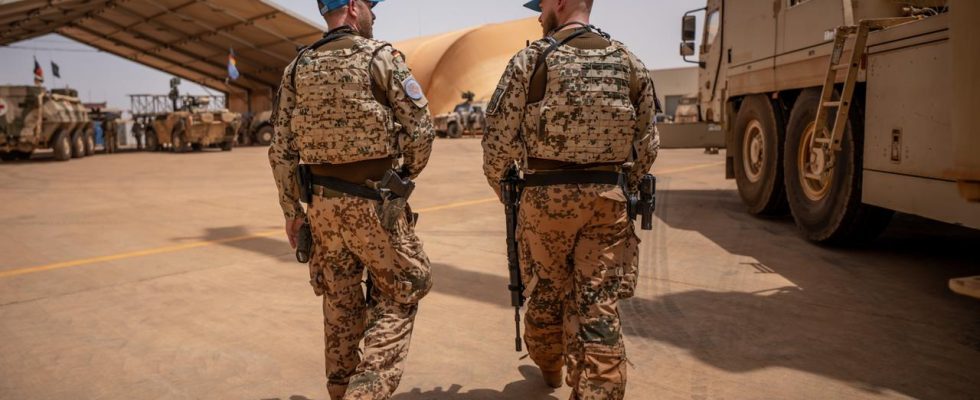report
The Bundeswehr will have withdrawn from Mali by the end of May 2024. She has to get tons of material to Germany – and at the same time continue to fulfill her mission. Russia could also play a role.
It’s a radio message with immediate effect: “Alert for the rapid reaction force,” echoes over the walkie-talkie. For the approximately 50-strong “Quick Reaction Force” (QRF) of the Bundeswehr in the crisis-ridden country of Mali, this means dropping everything. The reaction to the radio announcement can be felt within seconds in the German camp Castor.
At a run and at 47 degrees in the shade, the soldiers, packed with flak jackets, rush through the red desert sand. Engines hiss briefly, armored vehicles, in which the heavy weapons are already ready for the soldiers, drive up. A short briefing, establishing a radio connection – then the operation could begin. Could – because in this case it was just an exercise to test the troop’s speed of reaction.
Be on standby for as long as possible
As a precaution, those responsible for the radio message had announced from the outset that a rehearsal would be involved. Otherwise, the activation of the intervention force would have caused the entire camp in Gao, northern Mali, to get excited. If the QRF is called, it means: Something happened outside – in most cases something catastrophic.
“We’re on call. That means we’re waiting – just like the fire brigade at home – to set off when there’s a fire,” explains train driver Charlie. The requirement is that the QRF must be ready to depart within 30 minutes. During the alarm exercise, she did it in less than 15 minutes.
Exactly this “fire brigade unit” is one of the ones that will be kept on standby in Gao for as long as possible. Now that it is certain that the Germans will have left Mali by the end of May 2024. Securing the camp and those on patrol outside of the protected Castor camp is paramount to the end. “We want to be out and about for as long as possible. Because where we are, others cannot go about their shady business,” explains contingent leader Heiko Bohnsack in an interview with the ARD Capital Studio.
“You’re most vulnerable on the way back”
But the Germans, who have now officially started withdrawing from Mali, will no longer take on this task forever. “You’re most vulnerable on the way back,” is an ironclad rule among soldiers. And so Commander Bohnsack and the German troops as a whole have to walk a delicate tightrope with the withdrawal.
To leave exactly the material in Mali that is necessary to fulfill the assignment – and at the same time not to make yourself vulnerable. “A reduction in capabilities always means that the danger for the contingent increases because weapon systems and weapons are released,” warns Lieutenant Colonel Frank. He is one of 16 logistics experts who have just flown to Gao to organize the departure – as quietly as possible. That will not be easy. Because the land route is considered too unsafe, the lion’s share of the material is to be flown out by air.
Force majeure and permits to fly
But in the next few weeks, the sandstorm and rainy season will begin. And that there could be another form of “force majeure” that would make flights more difficult in addition to these natural events, the state secretary in the Ministry of Defence, Siemtje Möller, recently got a very personal impression of this.
When Möller wanted to get into a Bundeswehr A400M early Thursday morning to fly from the German base in neighboring Niger to Gao in Mali to visit the troops, the Malian authorities did not have permission for the flight. The emissary from the Ministry of Defense had to switch from the gigantic, gray A400M transport aircraft to a sleek and short-term leased civilian Beechcraft type aircraft.
Möller does not accuse the Malian authorities of malicious intent: “I do not assume that it was a motivated sabotage of the flight. But that it was actually not released due to bureaucratic processes,” she said.
What role does Russia play?
Nevertheless: The Germans can expect that the Malian bureaucracy does not always approve flights for return transport in good time. And to what extent the Russian forces could still play a role on the ground, which at the invitation of the Malian troops have nested right next to the airfield that the Germans also use, is difficult to predict.
Incidentally, State Secretary Möller was confronted with another flight problem a day later: Shortly before the return flight to Berlin, cracks were discovered in the windscreen of her government aircraft, which led to an unplanned extension of the trip. The extreme heat of up to 60 degrees on the runway in Niger was probably responsible. Also a form of force majeure.

